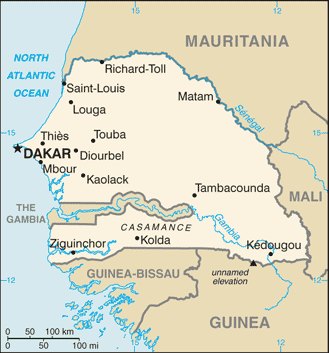Senegal

The Republic of Senegal has an estimated population of 12.8 million (UN, 2010). The capital is Dakar. Senegal has an area of 196,722 sq km (75,955 sq miles). The main languages are French (official), and Wolof.
Senegal became independent in 1960 from France. Since gaining its independence, the country has been a model of stability in Africa. Senegal has always been a multi-party system governed by the people. However, despite peace deals between the government and rebels, in the southern Casamance region the low-level separatist war has killed hundreds of people and still continues. Senegal has a long record of participating in international peacekeeping operations and mediation.
Despite the constitution of Senegal, which grants equal rights to men and women and prohibits discrimination against women, the government does not enforce these laws. Discrimination against women is widespread in the country and is especially apparent in rural areas. Women are limited to traditional roles. Female genital mutilation, polygamy, and early marriage are widely spread in Senegal.
- Senegal ratified the Protocol to the African Charter on Human and Peoples' Rights on the Rights of Women in Africa (The Maputo Protocol) on the 27th of December 2004.
- The Convention on the Elimination of All Forms of Discrimination against Women (CEDAW) was ratified by Senegal on the 5th of February 1985.
- Senegal has not yet adopted a National Action Plan on United Nations Security Council Resolution 1325 (UNSCR 1325).
- There are no former or current UN Peacekeeping mandates in Senegal
Source: BBC, AlertNet, CIA, UN, SIGI
